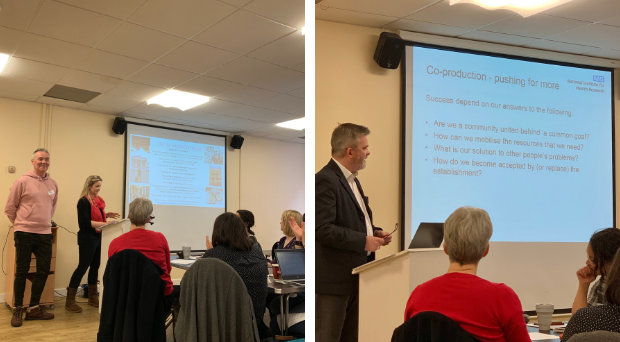
The event was put on by colleagues from INVOLVE, Centre for Public Engagement, Kingston University and St George’s, University of London and University College London Centre for Co-production in Health Research. We were supported by Academic Health Sciences Network for Kent, Surrey and Sussex and National Institute for Health Research Design Service London.
We are grateful to our speakers, attendees and followers on Twitter for making the day a successful one.
The sharing of power is the key principle in co-producing research and this is reflected in guidance co-produced by INVOLVE and colleagues from National Institute for Health Research and beyond.
The event was an opportunity to explore the power sharing aspect of co-production. It was also an opportunity for people to showcase their work and to network. Finally, with attendees including public members, researchers, healthcare practitioners and staff from National Institute for Health Research, it provided a platform for us to talk, learn from and challenge each other.
As was acknowledged during the event sharing power can be challenging. There were many observations and potential opportunities raised during the event, too many to list them all here but here are a small number of them:
- Simon Denegri, National Director for Patients, Carers and the Public, National Institute for Health Research kicked off the day and posed a series of questions including how do make sure that co-produced research becomes an accepted and valued approach to research? How do we push for more?
- Rebecca Baines, Researcher at University of Plymouth and John Donovan, public member, noted how co-producing research presented a challenge to how the research community currently views ‘impacts’. It’s not just about number of publications and conference presentations; the very process of co-producing can increase confidence of individuals involved in the research. Currently these are not valued.
- Rosie Davies, Michelle Farr (Collaboration for Leadership in Applied Health Research and Care West), and Nick Leggett, public member challenged researchers to be open to change. We need to build into research projects – and indeed value – the space to do things differently.
- Annette Boaz, Kingston University and St George’s, University of London, co-editor of Evidence and Policy, gave an international perspective on co-production and noted that we now have a more nuanced understanding of co-production. This inevitably led to a debate about the merits or otherwise of having a ‘tight’ definition of co-production. In addition, via Twitter we were warned of the dangers of ‘faux production!’
- Karolina Gombert, Kingston University and St George’s, University of London, and Martin Malcolm, public member raised the issue of how to value and reward the input of public members.
- In the afternoon, there was a panel discussion where a significant plea was made to funders. If funders are to embrace co-production then they need to understand co-production and change their processes and procedures. Co-produced research takes time, in terms of relationship development, sharing power, working collaboratively and allowing solutions to emerge. It was acknowledged that this does not always sit easily alongside funders more rigid approach to research in terms of project plans, timelines and a hierarchical approach to research with a principle investigator being ultimately accountable.
- Finally, there were challenges to journals. In particular, peer reviewed journals were challenged to increase their understanding of ‘non-conventional’ co-produced research and the value of published articles co-authored with public members.

We may not have solved any of these challenges but as Rebecca Baines, Researcher at University of Plymouth and John Donovan, public member noted -‘co-production begins with a conversation.’
This was our second event on ‘co-production’. Our first one ‘tested the market’ and the 50 places available were snapped up in a day. This year we doubled the number and found that within four working days all the 120 tickets had gone and we had 50 people on the waiting list.
Already we have had people suggesting that this should be an annual event – and we will partner with the journal Research Involvement and Engagement in 2020 – and requests to ‘take it on tour’ (Manchester and Newcastle have already been suggested). All things (or nearly all things!) are possible and we would like to hear from potential partners from the different regions about working with them. Let’s continue the conversation and build our co-production community.
Comments